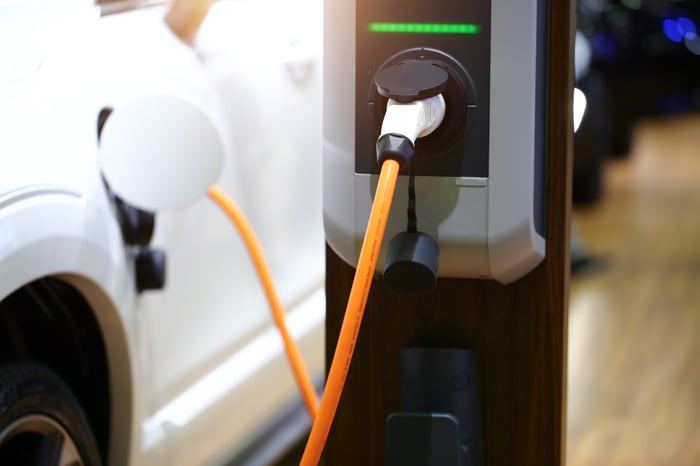When it comes to investing success, Berkshire Hathaway (BRK.A -0.59%) (BRK.B -0.92%) CEO Warren Buffett is in a class of his own. Buffett may not be infallible, but he's helped create more than $600 billion in shareholder value for the company's shareholders since taking the helm in 1965. As a whole, Berkshire Hathaway's shares have averaged an annual gain of 20% over the past 56 years, leading to an aggregate gain of better than 3,300,000%.
Interestingly, though, the Oracle of Omaha's success isn't the result of diversification. Buffett believes diversification is only a necessity if you don't know what you're doing. As of this past weekend, the cumulative value of the nearly four dozen stocks held by Berkshire Hathaway was $329.7 billion. However, just 10 companies made up $286.1 billion, or 87%, of Warren Buffett's portfolio.

Berkshire Hathaway CEO Warren Buffett. Image source: The Motley Fool.
1. Apple: $134.9 billion
Innovation kingpin Apple (AAPL 0.96%) is often referred to by the Oracle of Omaha as Berkshire Hathaway's "third business." With over 907 million shares held and Apple regularly buying back its common stock, Berkshire's stake in the company has grown to 5.5%.
Buffett's Apple investment is all about the power of branding, innovation, and transformation. Apple is the leading smartphone brand in the U.S., is benefiting immensely from the introduction of 5G wireless capability, and is steadily transforming itself into a platforms' company that'll be focused on subscription services. This shift, led by CEO Tim Cook, will allow Apple to better weather product replacement cycles, and it should have a positive long-term effect on operating margins and customer loyalty.

Image source: Getty Images.
2. Bank of America: $49.1 billion
There isn't an industry Warren Buffett loves more than bank stocks. With permission from the Federal Reserve Bank of Richmond, Berkshire Hathaway has increased its stake in Bank of America (BAC -0.08%) to more than 1 billion shares, or 12.5% of outstanding shares. Normally, a 10% stake or higher would qualify an investor like Berkshire Hathaway as a bank holding company.
Bank of America is the most interest-sensitive of the money-center banks, which means it's the best-positioned to take advantage of higher lending rates come 2023 (and beyond).
Also, BofA has done an enviable job of promoting digital banking. With more bank customers than ever transacting online or via mobile app, Bank of America has been able to cut costs by consolidating some of its physical branches.

Image source: American Express.
3. American Express: $28.4 billion
A big theme within Buffett's investment portfolio is that he loves financial stocks. Payment processor and lender American Express (AXP 0.25%) is the third longest-tenured company, with Berkshire holding a position since 1993.
AmEx's success has long been tied to its ability to draw in affluent clientele. The well-to-do are less likely to alter their spending habits when minor economic contractions or recessions arise.
Further, American Express is what I call a "double-dipper." In addition to processing credit transactions, it also acts as a lender, and is therefore able to collect interest income and fees from cardholders. Since economic expansions last for years, AmEx is a good bet to excel for long periods of time.

Image source: Coca-Cola.
4. Coca-Cola: $21.8 billion
Beverage giant Coca-Cola (KO 1.10%) happens to be Buffett's longest-turned holding. Berkshire Hathaway has held shares of Coke on an uninterrupted basis since 1988. With a cost basis on Coke of $3.25, Buffett and his investing team are now netting a 52% annual yield on cost.
While Coca-Cola isn't the growth story it once was, it's still quite dominant. Its products can be found in all but two countries worldwide (North Korea and Cuba), and it has more than 20 brands generating $1 billion or more in annual sales.
Coke also controls 20% of cold beverage market share in developed countries and 10% of cold beverage share in emerging markets. This gives the company highly predictable cash flow in established markets and organic growth potential in emerging regions.

Image source: Getty Images.
5. Kraft Heinz: $11.8 billion
Consumer staples stocks no longer comprise a large percentage of Buffett's portfolio like they did two decades ago. However, packaged-foods company Kraft Heinz (KHC 0.96%) is no slouch. At $11.8 billion, it's Berkshire Hathaway's fifth-largest holding.
Although Kraft Heinz is benefiting from the pandemic -- i.e., more consumers are eating at home -- it's arguably been one of Buffett's worst investments. The Oracle of Omaha freely admits that Heinz overpaid for Kraft Foods in 2015. Four years later, it led to a writedown in excess of $15 billion.
If there is a bright side, it's that Kraft Heinz is paying a hearty 4.4% yield. Nevertheless, with a 26.6% stake in Kraft Heinz, Buffett could reasonably be described as "stuck" in this position.

Image source: Getty Images.
6. Moody's: $9.4 billion
Credit ratings agency and analytics company Moody's (MCO -0.65%) is another longtime holding that's grown into a huge position. Moody's has been a holding since it was spun off from Dun & Bradstreet in 2000, with Berkshire sporting an unrealized gain of more than 3,700%, thus far (not including dividends).
In recent years, historically low lending rates have been a boon for Moody's. The ability for corporations to issue low-interest debt has kept its bond-rating agency busy.
Meanwhile, the complexity of the financial markets and ever-changing tax landscape have helped drive consistent double-digit growth to Moody's Analytics segment.

Image source: U.S. Bank.
7. U.S. Bancorp: $9.2 billion
Have I mentioned that Warren Buffett likes bank stocks? Although BofA is his clear favorite, Berkshire's position in regional bank U.S. Bancorp (USB 1.18%) is pretty much always just below the 10% threshold that would qualify it as a bank holding company.
What's really impressive about U.S. Bancorp is its digitization push. In the September-ended quarter, 80% of all transactions were completed digitally, up 13 percentage points from the comparable quarter in 2019. Since online or mobile transactions are significantly cheaper than branch-based transactions, the company has been able to consolidate its branches to improve its operating efficiency.
U.S. Bancorp also avoided the riskier derivative investments that sacked money-center banks during the financial crisis. By sticking to the bread-and-butter of banking (i.e., loan and deposit growth), it's been able to deliver industry-topping return on assets.

Image source: Getty Images.
8. BYD Corp.: $8.6 billion
Something you might not realize about Buffett is that he invested a little over $231 million in 2008 into China-based electric vehicle (EV) manufacturer BYD (BYDDY 1.50%). Today that investment is worth around $8.6 billion.
EVs are a no-brainer growth trend globally, but are an especially intriguing investment idea in China, the world's largest auto market. According to the Society of Automotive Engineers of China, half of all auto sales by 2035 in China are expected to be some form of alternative energy.
In the third quarter, BYD sold approximately 183,000 next-gen vehicles, which includes EVs and hybrids. If looking at just EVs, the company sold close to 92,000, which was nearly triple the year-ago quarter.

Image source: Getty Images.
9. Verizon Communications: $8.4 billion
The newest big investment from Warren Buffett is telecom stock Verizon (VZ -0.78%). The Oracle of Omaha and his team acquired nearly $9 billion worth of Verizon shares in the first and second quarters of 2021.
On one hand, there's a good likelihood that Verizon will benefit from the rollout of 5G wireless infrastructure. Though its high-growth days are long gone, Verizon should benefit from increased data consumption as more consumers and businesses upgrade their devices. Since data is the company's key margin driver, the profitability arrow is pointing higher.
On the other hand, the real lure for Buffett and his team might be Verizon's rock-solid 4.8% yield. With inflation rising and bond yields still near historic lows, a dividend stock like Verizon is a smart and safe way to generate income.

Image source: Getty Images.
10. Bank of New York Mellon: $4.4 billion
Bank of New York Mellon (BK 0.10%), the largest custodian bank in the world, rounds out the top 10.
The likely reason Buffett has stuck by Bank of New York Mellon is the company's safer revenue stream. Whereas traditional banks rely on net interest income from loans for their bulk of their revenue, trust banks like Bank of NY Mellon generate most of their revenue from fees based on assets under custody. Even if interest rates change, BNY Mellon will see less of an impact than traditional banks.
However, it's worth pointing out that because BNY Mellon also operating as an asset manager, lower interest rates have modestly pinched its profit potential. In many ways, Buffett's portfolio is going to benefit when interest rates and yields start climbing.





